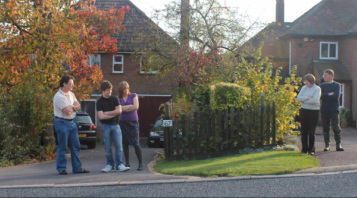Environmental Food Choices
Food systems account for a large amount of current global greenhouse gas (GHG) emissions. Food purchases are a regular and frequent behaviour, records of which are available in receipts and store loyalty cards. Given recent advances in identifying the environmental impact of individual products, there is an opportunity to match this to food purchase data. We are investigating how to help people understand how their food choices impact the environment, and whether this can have a long term effect on behaviour.
GDPR information relating to a current study is available here.
Food systems account for a large amount of current global greenhouse gas (GHG) emissions. Food purchases are a regular and frequent behaviour, records of which are available in receipts and store loyalty cards. Given recent advances in identifying the environmental impact of individual products, there is an opportunity to match this to food purchase data. We are investigating how to help people understand how their food choices impact the environment, and whether this can have a long term effect on behaviour.
GDPR information relating to a current study is available here.

Environmental experiences
Funding: ESRC - Urgent response grant: Public perceptions of climate change and adaptation responses in the immediate aftermath of the 2014 winter flooding - CI
I am interested in how environmental experiences, e.g. flooding, power cuts, that could be attributed to climate change impacts, impact public perceptions of climate change. It is interesting to see whether people relate their experiences to climate change, and to examine the processes by which the experience translates to changes in behaviour, both at an individual and collaborative level.
Spence, A., Ortega-Andeane, P., Leygue, C., (2021). Sustainability following adversity: Power outage experiences are related to greater energy saving intentions in the United Kingdom and Mexico. Energy Research and Social Science. 79, 102143.Demski, C., Capstick, S., Pidgeon, N., Sposato, R. G., Spence, A. (2016). Experience of extreme weather affects climate change mitigation and adaptation responses. Climatic Change.
Spence, A., Poortinga, W., Butler, C. and Pidgeon, N. (2011). Perceptions of climate change and willingness to save energy related to flood experience. Nature Climate Change. 1, 46-49.
Funding: ESRC - Urgent response grant: Public perceptions of climate change and adaptation responses in the immediate aftermath of the 2014 winter flooding - CI
I am interested in how environmental experiences, e.g. flooding, power cuts, that could be attributed to climate change impacts, impact public perceptions of climate change. It is interesting to see whether people relate their experiences to climate change, and to examine the processes by which the experience translates to changes in behaviour, both at an individual and collaborative level.
Spence, A., Ortega-Andeane, P., Leygue, C., (2021). Sustainability following adversity: Power outage experiences are related to greater energy saving intentions in the United Kingdom and Mexico. Energy Research and Social Science. 79, 102143.Demski, C., Capstick, S., Pidgeon, N., Sposato, R. G., Spence, A. (2016). Experience of extreme weather affects climate change mitigation and adaptation responses. Climatic Change.
Spence, A., Poortinga, W., Butler, C. and Pidgeon, N. (2011). Perceptions of climate change and willingness to save energy related to flood experience. Nature Climate Change. 1, 46-49.
Engaging people with energy

Funding: EPSRC – Creating the Energy for Change project –PI; Funding: Horizon Digital Economy Research – Smart Living Project –PI; Funding: UKERC – Transforming the UK Energy System –CI)
I am very interested in what motivates people to save energy and how people interact with others around energy use. In particular I am concerned with investigating how to promote energy savings and how and when energy saving may spillover into engaging with further sustainable behavior.
Within this, we are exploring how framing energy saving in different ways (e.g. in terms of cost or environmental issues) may more strongly motivate energy savings. Of course, our behavior is strongly influenced by those we interact with, e.g. our family members at home and our work colleagues at work, and we are particularly considering how interactions around energy may develop and be influenced by energy feedback.
Our work here is very multidisciplinary and applied and we have variously installed energy monitoring equipment in homes and workplaces in order to understand the impact of energy feedback on perceptions and behavior - see a recent blog on our work here. We are currently developing this applied work in terms of type of information given, associated communications and goal setting.
Spence, A., Demski, C., Butler, C., Parkhill, K., and Pidgeon, N. (in press). Public perceptions of demand side management and a smarter energy future. Nature Climate Change.
Leygue, C., Ferguson, E., Skatova, A., and Spence, A. (2014). Energy sharing and energy feedback: Affective and behavioural reactions to communal energy displays. Frontiers in Energy Research, section Energy Systems and Policy. 2, 29.
Spence, A., Leygue, C., Bedwell, B. and O’Malley (2014). Engaging with energy reduction: Does a climate change frame have the potential for achieving broader sustainable behaviour? Journal of Environmental Psychology. 38, 17-28.
I am very interested in what motivates people to save energy and how people interact with others around energy use. In particular I am concerned with investigating how to promote energy savings and how and when energy saving may spillover into engaging with further sustainable behavior.
Within this, we are exploring how framing energy saving in different ways (e.g. in terms of cost or environmental issues) may more strongly motivate energy savings. Of course, our behavior is strongly influenced by those we interact with, e.g. our family members at home and our work colleagues at work, and we are particularly considering how interactions around energy may develop and be influenced by energy feedback.
Our work here is very multidisciplinary and applied and we have variously installed energy monitoring equipment in homes and workplaces in order to understand the impact of energy feedback on perceptions and behavior - see a recent blog on our work here. We are currently developing this applied work in terms of type of information given, associated communications and goal setting.
Spence, A., Demski, C., Butler, C., Parkhill, K., and Pidgeon, N. (in press). Public perceptions of demand side management and a smarter energy future. Nature Climate Change.
Leygue, C., Ferguson, E., Skatova, A., and Spence, A. (2014). Energy sharing and energy feedback: Affective and behavioural reactions to communal energy displays. Frontiers in Energy Research, section Energy Systems and Policy. 2, 29.
Spence, A., Leygue, C., Bedwell, B. and O’Malley (2014). Engaging with energy reduction: Does a climate change frame have the potential for achieving broader sustainable behaviour? Journal of Environmental Psychology. 38, 17-28.
Horizon Energy Research
Check out our video overviews of our energy research at Horizon.
|
Interacting Around Energy Use |
Understanding Energy Use |
|
|
|
Future Smart Grid Scenarios for the UK

Contravision videos of DSM possibilities
Funding UKERC – Scenarios for the development of smart grids in the UK – CI; E.On – SWITCH: Smart Wireless Integrated Technology Control in Homes – CI)
This research explores what our energy systems are likely to look like in the future. In particular we are exploring how we might move towards a smarter energy grid in the UK and what has to happen for us to get there.
I am particularly interested in public perceptions of a smarter energy grid and of possible demand side management (DSM) possibilities. In order to facilitate explaining what DSM is to project participants, we produced a series of videos which illustrate potential future DSM possibilities.
These videos can be viewed here. Since producing these, they have been translated into Chinese, Italian and German and used in further academic research by other groups. Please let me know if you are interested in using these videos in any way.
Goulden, M., Bedwell., B., Rennick-Egglestone, S., Rodden, T., and Spence, A. (in press). Smart Grids, Smart Users? The Role of the User in Demand Side Management. Energy Research & Social Science.
Balta-Ozkan, N., Watson, T., Connor, P., Axon, C. Whitmarsh, L. Davidson, R., Spence, A., Xenias, D., Cipcigan, L. and Taylor, G. (2014) Scenarios for the Development of Smart Grids in the UK - Synthesis Report (UKERC: London).
This research explores what our energy systems are likely to look like in the future. In particular we are exploring how we might move towards a smarter energy grid in the UK and what has to happen for us to get there.
I am particularly interested in public perceptions of a smarter energy grid and of possible demand side management (DSM) possibilities. In order to facilitate explaining what DSM is to project participants, we produced a series of videos which illustrate potential future DSM possibilities.
These videos can be viewed here. Since producing these, they have been translated into Chinese, Italian and German and used in further academic research by other groups. Please let me know if you are interested in using these videos in any way.
Goulden, M., Bedwell., B., Rennick-Egglestone, S., Rodden, T., and Spence, A. (in press). Smart Grids, Smart Users? The Role of the User in Demand Side Management. Energy Research & Social Science.
Balta-Ozkan, N., Watson, T., Connor, P., Axon, C. Whitmarsh, L. Davidson, R., Spence, A., Xenias, D., Cipcigan, L. and Taylor, G. (2014) Scenarios for the Development of Smart Grids in the UK - Synthesis Report (UKERC: London).
Perceptions of Climate Change

(ESRC - Public perceptions of climate change and adaptation responses in the immediate aftermath of the 2014 winter flooding; ESRC - Public perceptions of climate change and energy futures in Britain – CI; UKERC – Transforming the UK Energy System: Public Values, Attitudes and Acceptability –CI)
One of my primary interests is in public perceptions of climate change, and how these may change over time and be influenced by communications received. The idea that climate change is an abstract, unobservable phenomena is really central to some of my ideas here. Currently I am thinking about how experiences of impacts considered relevant to climate change (e.g. flooding) may influence perceptions of the phenomenon.
I am also interested in scepticism and uncertainty surrounding climate change. People are often unclear about what facet of climate change their scepticism or uncertainty pertains to (e.g. anthropogenic nature, effects) and I think this is crucial. I am currently interested in how uncertainty communications about one aspect of climate change may transfer to uncertainty about another aspect of climate change that is logically unrelated.
Spence, A., Poortinga, W. and Pidgeon, N. (2012). The Psychological Distance of Climate Change. Risk Analysis: Special Issue on Climate change. 32, 957-972.
Spence, A., Poortinga, W., Butler, C. and Pidgeon, N. (2011). Perceptions of climate change and willingness to save energy related to flood experience. Nature Climate Change. 1, 46-49.
Spence, A. and Pidgeon, N. (2010). Framing and Communicating Climate Change: The Effects of Distance and Outcome Frame Manipulations. Global Environmental Change, 20, 656-667.
Spence, A., Pidgeon, N., and Uzzell, D. (2009). Climate Change: Psychology’s Contribution. The Psychologist. 21, 108-111.
Spence, A. and Pidgeon, N. (2009). Psychology, Climate Change and Sustainable Behaviour. Environment: Science and Policy for Sustainable Development. 51, 9-18. (3rd most cited article in journal 2009-11)
One of my primary interests is in public perceptions of climate change, and how these may change over time and be influenced by communications received. The idea that climate change is an abstract, unobservable phenomena is really central to some of my ideas here. Currently I am thinking about how experiences of impacts considered relevant to climate change (e.g. flooding) may influence perceptions of the phenomenon.
I am also interested in scepticism and uncertainty surrounding climate change. People are often unclear about what facet of climate change their scepticism or uncertainty pertains to (e.g. anthropogenic nature, effects) and I think this is crucial. I am currently interested in how uncertainty communications about one aspect of climate change may transfer to uncertainty about another aspect of climate change that is logically unrelated.
Spence, A., Poortinga, W. and Pidgeon, N. (2012). The Psychological Distance of Climate Change. Risk Analysis: Special Issue on Climate change. 32, 957-972.
Spence, A., Poortinga, W., Butler, C. and Pidgeon, N. (2011). Perceptions of climate change and willingness to save energy related to flood experience. Nature Climate Change. 1, 46-49.
Spence, A. and Pidgeon, N. (2010). Framing and Communicating Climate Change: The Effects of Distance and Outcome Frame Manipulations. Global Environmental Change, 20, 656-667.
Spence, A., Pidgeon, N., and Uzzell, D. (2009). Climate Change: Psychology’s Contribution. The Psychologist. 21, 108-111.
Spence, A. and Pidgeon, N. (2009). Psychology, Climate Change and Sustainable Behaviour. Environment: Science and Policy for Sustainable Development. 51, 9-18. (3rd most cited article in journal 2009-11)
